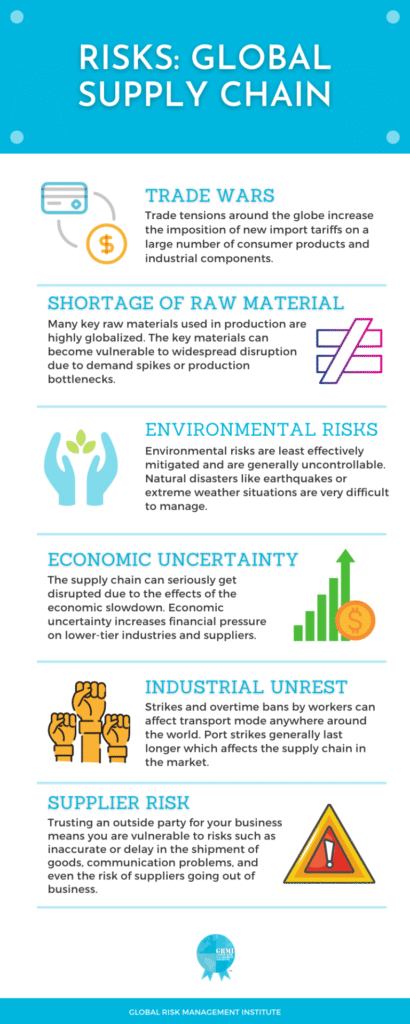
Risks in Global Supply Chain
Risks in Global Supply Chain
Shahran Sayyed’s Journey into Risk Management
Shahran Sayyed is a geology graduate who changed his career by pursuing a risk management course. He pursued a career in risk management in India after completing the Post-Graduate Diploma in Risk Management (PGDRM) course from GRMI. In the article below, he writes about the ‘Risks in Global Supply Chain’. Shahran is currently working with Grant Thornton. In his opinion, PGDRM is one of India’s best job-oriented courses.
Risks in the Global Supply Chain
The modern economy depends on sophisticated and complex supply chains. However, these supply chains remain vulnerable to various risks, creating short-term costs and delivery challenges. Constant changes occur in the modern supply chain, and these changes are inevitable. Businesses need risk management practices to counter these supply chain risks.
Supply chains exist in air, land, and ocean freight. If companies assess risks poorly, the cost of freight spend will rise and the brand’s value will diminish. By understanding global supply chain risks, organizations can reduce the overall impact of disruptions.

The Most Important Risks in the Global Supply Chain
Trade Wars
Trade tensions across the globe have led to new import tariffs on several consumer products and industrial components. Such trade wars create widespread uncertainty and increase prices, making raw materials harder to obtain. This results in significant disruptions in the supply chain.
Shortage of Raw Material
Many key raw materials used in production are sourced globally. These critical materials often become vulnerable to widespread disruption due to sudden demand spikes or production bottlenecks. Such shortages can halt production and create inefficiencies in the overall supply chain.
Environmental Risks
Environmental risks are among the hardest to mitigate and are often uncontrollable. Natural disasters like earthquakes or extreme weather events severely impact supply chain operations. For example, tropical storms can disrupt ocean carriers, while flooding, storms, or earthquakes may close off airports, docks, and roads. These events delay shipments and cause substantial uncertainty in logistics.
Economic Uncertainty
Global economic slowdowns put immense pressure on supply chains. Economic uncertainty increases financial strain on lower-tier industries and suppliers. Companies must maintain close communication with suppliers, especially during external procurement, to ensure flexibility and quick response to changing market conditions. A survey by the Chartered Institute of Procurement and Supply revealed that ten percent of U.K. businesses with EU suppliers risked bankruptcy during Brexit-related customs delays.
Industrial Unrest
Worker strikes and overtime bans can disrupt transportation networks worldwide. Port strikes are especially damaging since they typically last longer, creating significant supply chain bottlenecks. Industrial disputes can hinder numerous ongoing transport operations across different regions, causing delays and financial setbacks.
Supplier Risk
Relying on external suppliers exposes businesses to multiple risks, including shipment delays, inaccuracies, communication failures, and the possibility of suppliers going out of business. To minimize these risks, businesses must conduct thorough due diligence and regular screening before onboarding suppliers. Periodic assessments also help ensure compliance and reliability. Managing supplier risk effectively requires collaboration between both parties to identify and mitigate potential issues.
Conclusion
The global supply chain continues to evolve, becoming more strategic as disruptions increasingly reach board-level discussions. Effective supply chain risk management enables businesses to assess risks comprehensively and build strategies to safeguard their bottom line.
Contributed by Shahran Sayyed (PGDRM Jan’20)
You may also like

How to Get Into Consulting: A Step-By-Step Guide

Why Risk Management Could Be Your Next Career in India


